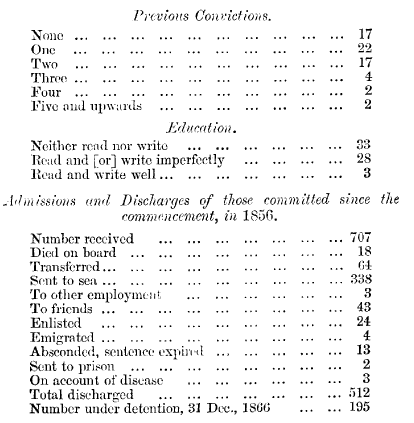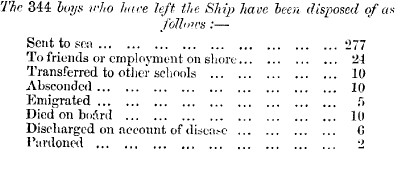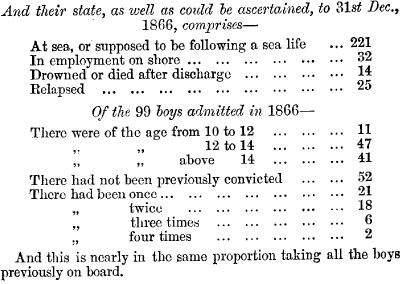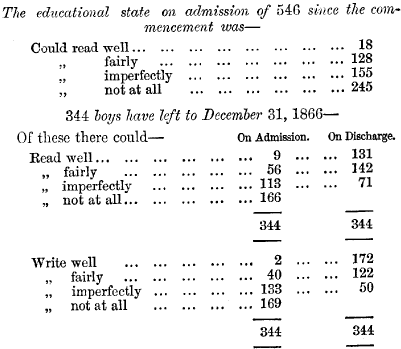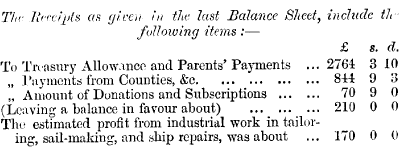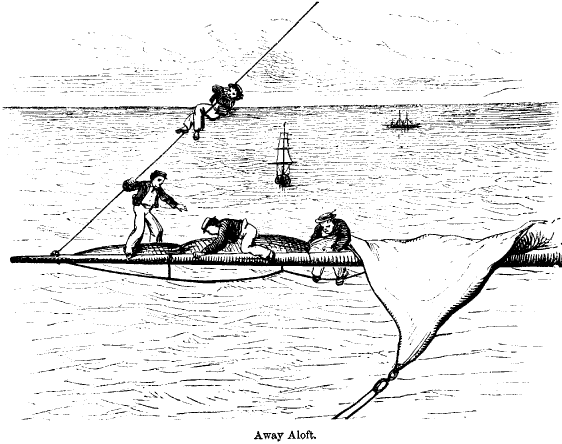THE
VOYAGE ALONE
IN THE
YAWL "ROB ROY,"
By JOHN MACGREGOR, M.A. APPENDIX.
Boys' Training Ships -- The Warspite -- The Akbar -- The Cornwall -- The Conway -- The Worcester -- The Clarence -- The Indefatigable -- The Chichester -- The Havannah -- The Endeavour, Land Ship -- The Southampton -- Training Ship for Yarmouth
WHEN the Rob Roy sailed away from England in this voyage alone, we had left much that is good and great and that is not to be found anywhere else on earth. But we had also left behind us some terrible sights for an Englishman to see in his country -- her crowded, squalid hovels, and her ignorant, sottish poor.
Hard work among such glowing scenes as these cannot be both constant and vigorous,* We have the poor always with us, but our help for them may he freshened by interruption. Christ himself did not always walk in Galilee, and it is not in brooding over misery that we are sure to find the right answer to the question racking our heartstrings: "What can I do to better all this?"
To give away my last garment or my last penny, will that be enough? "Giving" indeed, might be easier than "working," as a solution of the painful problem, but our duty is not to desert our post, but to defend it -- not to get rid of our talents as a burden, but to invest them as a trust. The self-pauperized mendicant monk is a miserable and demented travesty of the lives of the Apostles, who worked hard with their fisher's nets while they labored intensely for men's bodies and souls.
--
* We once asked a laborious Sunday school teacher if he had not taken a holiday -- "Yes," he said, "I was absent one Sunday during the last 26 years, and that was when my father died."
During a canoe voyage over Sweden, a novel and most interesting feature of their educational appliances in that country had been noticed with beneficial result.* This was "the Persuader," a man employed in each district to advise with the parents, and to induce them to send their children to school. London wanted a man of this sort, and the last year's journals of the excellent labors of "The Boy's Beadle", in our streets most amply justify his appointment.**
Better means for grasping the half-lost English child having lately been provided, we are encouraged to devise new methods for improving him. For though the adult criminal or sturdy vagrant may be shirked as too heavy, and he may be thrust off our individual shoulders upon his own self, or on the broad back of the community, there can be no doubt whatever that children must not be left to chance mercy. Every man of us is hound by humanity, patriotism, and Christianity to do something-not that only, but much to help the poor wretched English "Arab" child. The duty is for each of us, and one day -- not so far off either -- we must separately answer for it. We live in a crowd, but we die alone.
The Rob Roy yawl had sailed for months among healthy and comfortable people, where the beggar, and the sick, and the wretched were out of sight. But these we now come to at home again, and they have not been out of mind. Happy will it he for our log book this time also, if some page of it can tell of fresh thoughts for good gathered on the buoyant sea, or in the rustling breeze.
Therefore it is that we would now direct earnest attention to the new subject of Boys' ships.
* See 'The Rob Roy on the Baltic' (Second Edition), page 127.
**Birmingham is also adopting the plan. Information regarding it will be given at the Reformatory and Refuge Union, 24, New Street, Spring Gardens.
BOYS' TRAINING SHIPS.
THE following list of vessels, with a few particulars about each of them, is now collected for the first time, as a catalogue of a fleet that is rapidly increasing, and which, when adequately reinforced by others at our principal ports, ought to produce a constant supply of well taught, smart, and active lads, to be the British seamen of the future.
The first in the list was established more than a hundred years ago ; but above half of the other vessels were set up during the last few years.
The prizes alluded to in the flyleaf of this volume, will be arranged upon a definite plan, so as to extend their benefits over several years, and it is earnestly hoped that the very interesting subject of boys at sea, will engage the sympathies and practical aid of warm hearts and open purses among those who sail for pleasure, and who wish also to do some permanent good to the children of the sea.
THE WARSPITE.
THIS is the School-ship of the "Marine Society," which was founded in 1756 after exertions on behalf of a number of wretched and distressed boys, who were sent to serve under the Duke of Bolton in H.M.S. 'Barfleur.' Large legacies were from time to time left for the support of the scheme, and it was incorporated by Act of Parliament in 1772. By means of this Society nearly 60,000 boys have been fitted out and sent to sea, more than half of them into the Royal Navy. The complement of boys on board the 'Warspite' (moored at Woolwich) is 140. About 300 boys are sent out from the ship during the year, which rate of issue shows that their time of instruction is very short, and this, with the rule which precludes the admission of boys under 4 feet 8 inches in height, may, in some degree, account for the statement in the Report, that "The Society suffers as old Societies are apt to do, from the desire on the part of many persons to form new Institutions, rather than support those long established." From the last Annual Report, the expenditure on the boys appears to be more than £4000, including some repairs to the ship. The donations and subscriptions to the Society were less than £500; but the items are not so arranged as to show what is the average expense of a sailorboy's instruction.
THE AKBAR.
THIS vessel was moored in the Mersey in 1856, and is under the direction of the "Liverpool Juvenile Reformatory Association." All the boys now on board are under sentence of a magistrate,-the 'Akbar' being certified as a Reformatory.
The twelfth annual report (for 1866) of the Association, contains accounts of two other institutions managed by the committee, but the following relates to the 'Akbar.'
During the year, 64 boys were admitted, and 53 discharged; heaving 195 on the books. Most of the boys were admitted at ages between 11 and 15. A gentleman, well qualified to express an opinion by his high official position as Recorder of Liverpool, writes that "The two Reformatory ships have succeeded to a very large extent in clearing the town of juvenile crime, and also of reclaiming those who by this time would have been adult criminals.
"They are very much more successful than other Reformatories, because they provide an after-occupation for these subjects which, from its very nature, keeps them apart from their criminal associates."
Previous Convictions • Education • Admissions and Discharges of those committed since the commencement in 1856
T1.gif
On the occasion of a strike of the seamen on the Rock Ferry steamers, at Whitsuntide, a number of boys were sent on board, at the request of the manager, to supply their places, and came back with a highly complimentary testimonial to their good conduct and ability. The Committee also record the voluntary return to the ship of a boy who had absconded twelve months before, was doing well at sea, but could not be happy under the sense of having done wrong.
Of 121 boys sent out in 3 years, 68 were "doing well," and 41 "unknown."
The boys discharged and put out on license continue to find ships readily, and numbers of old boys continue to revisit the ship. Communication of this kind, as well as by letter, is encouraged in every way.
The cost of maintenance and outfits, deducting profits on Industrial account, has been £19 13s. 5d. per head on an average of 181 boys. The accounts show that a balance of £239 has to be provided for by subscriptions.
THE CORNWALL.
THE ship 'Cornwall; moored at Purfleet, is under the direction of the "School Ship Society," which was originated by "The Reformatory and Refuge Union." The ship is certified as a Reformatory for the reception of boys, juvenile offenders, sent by magistrates; but of, as a general rule, the Committee do not admit boys unless they are sentenced to three years' detention, arc between 13 and 15 years of age, and are certified as sound and healthy. Very interesting particulars are given In the Seventh Annual Report (ending December, 1866), which gives a great deal of useful information in a clear and compact form, including an account of how each boy has been disposed of after leaving the ship during the past year, and a balance sheet. From this we learn the following particulars : "On December 31, 1865, there were 155 boys on board, and 25 on license; 99 have been admitted, 54 discharged, leaving 225 on the register; of these 21 are on license, and two have absconded; showing that on December 31, 1866, there were actually on board 202 boys convicted, besides one unconvicted."
The Committee express how much they owe to the gentlemen at the shipping offices in London for the assistance they c( continue to give in sending the boys to sea; there has not been one case brought to the notice of the Committee of a boy returning home with a bad character.
More difficulty is now experienced in second shipments, and in spite of the kind assistance mentioned above, several 'Cornwall' boys with good characters have been obliged to seek other employment from failing to ship after a first voyage.
About 50 boys who were trained on board the 'Cornwall' have visited the ship during the past year ; many more have been heard of favorably. 'The Government Inspector reports : "I found the ship in thoroughly good order, the boys in good health, and looking remarkably bright and cheerful.
" The results of the school are very encouraging. Captain Burton is able to report upon 127 of the 142 lads who left the ship in 1862-4, and are still alive. Of this number 110, or above three-fourths (77.5 percent) are doing well, and 17 (or 12 percent) are doubtful or relapsed. Only 15 boys have passed out of his observation ; six others have died."
The agent in London, Mr. Pearson, still gives the Society his efficient services in shipping the boys, and looking after them on their return, to prevent their falling into the hands of criminals and other cunning scoundrels, who lie in wait for the sailor at the close of his voyage.
The 344 boys who have left the Ship have been disposed of as follows:-
And their state, as well as could be ascertained, to 31st Dec., 1866, comprises • Of the 99 boys admitted in 1866-
And this is nearly in the same proportion taking all the boys previously on board.
The educational state on admission of 546 since the commencement was • 344 boys have left to December 31, 1866:-
The average time on board of the 50 who left in 1866 was 2 years and 5 months, 21 days.
The Receipts as given in the last Balance Sheet, include the following items :-
THE CONWAY.
THIS is a training ship, moored at Liverpool in 1859. The following information can be gleaned from the eighth, the last annual report of the Committee for the 'Conway,' which however contains no balance sheet, nor distinct statement as to the number, condition, and disposal of the boys on board, while it is somewhat profuse in verbatim reports of speeches and letters that might be well curtailed by abridgment and by omitting repetitions.
H.M.S. 'Conway,' moored in the River Mersey, off Rock Ferry, is designed mainly to train and complete the education of boys intended for officers in the merchant Navy. Boys intended for the Royal Navy are also admitted, and receive special training for that service.
The ship is under the direction of the " Mercantile Marine Service Association," which comprises about 900 captains sailing from the port of Liverpool.
There is a complete and efficient Nautical and Educational Staff maintained, by whom the boys are carefully and regularly Instructed, and exercised in all the duties of a first-class ship, and receive a general education.
Her Majesty the Queen has been pleased to declare her intention to present annually a gold medal to the boys of the 'Conway.' Also, with a view to encourage boys in the 'Conway' School to qualify themselves for cadetships in the Navy granted by the Admiralty, Her Majesty has been pleased to declare her intention of offering a prize annually to the boys who compete for Cadetships in Her Majesty's Service. This prize will consist of a binocular glass, with a suitable inscription, and a sum of 35£ towards the expenses of the outfit of the boy who obtains the prize.
The First Lord of the Admiralty kindly places a Nomination for a Naval Cadetship at the disposal of the Committee of Management each year. By an order of the Board of Trade, two years on board the 'Conway' will be reckoned as one year at sea. Many of the leading shipowners of Liverpool will give a preference to the Cadets of the Institution.
"No boys are received under the age of twelve, or who have passed their sixteenth birthday."
Boys cannot remain longer than three years.
The boys are taught to sling and lash up their own hammocks; and in summer have to scrub their hammocks and bags. Each in his turn serves as messman for one day to his mess, under the inspection and guidance of the captain of the mess. In turn the boys keep an anchor watch, two at a time, for two hours.
On two afternoons in each week the boys are landed for recreation.
The captains of subdivisions are boys who, for exemplary conduct, have been selected for these positions of trust and authority. They are exempt from the manual labor of washing decks or being messmen, and there are other privileges attached to the office which make it an object of emulation to the well-disposed.
Divine Service is performed on Sundays, and Prayers are read twice each day.
Corporal punishment is only administered to boys whose names have been struck off the Good Conduct List, or for first offenses of a very serious kind. The total number of boys on the books in June, 1867, was 94. While in 1864 there were 126, and in 1865 117 boys, there were in 1866 108, of whom 71 left and 57 new pupils were admitted. The balance in favor of the funds was about 700£. While it is recorded that 80£ had to be spent in changing the ship's moorings, there is no information as to the annual cost of the Institution.
In 1866 the prizes wore distributed by the Duke of Edinburgh, and in 1867 by some of the Lords of the Admiralty.
THE WORCESTER.
THE following is learned from the Prospectus of the Thames Marine Officers' Training Ship 'Worcester,' opened in 1862 and now moored at Erith :
There are few professions for which some preliminary training is not considered indispensable; and it may be safely asserted that in no case is it more necessary than for a calling, to secure success in which, much technical knowledge, great presence of mind, and the capability of influencing the willing obedience of others, are especially requisite. Very little reflection upon the means by which these qualities may be acquired will dispel the fallacious impressions too generally prevalent, that boys intended for mercantile marine officers should be sent to sea young, in order that they may learn their duty there. To this unfortunate error, the great scarcity of properly trained officers for the merchant service may be chiefly attributed.
To try the experiment of educating respectable boys intended for the sea on board a Training Ship in the Thames, Her Majesty's Ship 'Worcester,' a fine 50-gun frigate, was given by the Admiralty to a committee of shipowners and others, and was opened for the reception of Pupils.
The Queen and the Board of Trade give prizes of the same kind as described for the 'Conway.'
The 'Worcester' accommodates about 130 boys.
The especial object of the Association is the training of boys for a seafaring life, under an able Commander and Schoolmasters with efficient subordinate officers; they are exercised in all the duties of a first-class ship ; are taught practical seamanship, such as knotting, splicing, reefing, furling, heaving the lead, management of boats, swimming, &c.; also navigation and nautical astronomy. They are practised in gunnery, and so prepared, that after practical experience at sea, they may become thorough masters of their profession.
Besides the usual branches of a sound English Education, geometry, trigonometry, mechanics, steam engine, marine surveying, chart-drawing and the French language are taught to all on hoard,
Though the boys are allowed "shore leave," they often prefer to spend their play-hours's in the ship or sailing about in her smaller boats.
No boys are admitted who are under 12 or over 15 years of age, nor are they to remain on board after they have attained the age of 17.
There is Divine Service on board morning and evening on Sundays, and Prayers are read twice each day.
From some Reports published by the Committee, we find that since the commencement of the School in 1862, 365 boys have entered and 240 have left, nearly all for sea. During the year ending June, 1867, 55 boys entered, "and about the same number left for sea." The number on board In 1866 was 130, and in 1867, 125 The expense of each boy's education amounts to about 55£. yearly. In the published account of the annual proceedings are reports of sensible and interesting speeches addressed to the boys, and the questions for the examinations (one of these being in Scripture as a subject), are given at length as well the "marks" attained and the record of each boy's conduct, "good" and " bad," for each week throughout the year.
The prizes were distributed in 1866 by the Prince of Wales, and in 1867 by one of the late Lords of the Admiralty. The following is a good specimen of the Examination Papers :
GEOGRAPHY1. What are the chief towns, bays, and headlands on the Atlantic coast of North America? Draw the coast line if you can.
2. Name the rivers, and state whence they come, which flow toward) the Gulf of Mexico. Sketch the Gulf.
3. Where are Trinidad, Curacoa, Panama, Cayenne, Callao, Valparaiso Monte Video, and Rio Janeiro, and what do they export?
4. Draw a map of India and put in the rivers Ganges, Indus, and Godavery, and the towns of Calcutta, Madras, and Bombay. Fill in your map if you can.
5. State what you know of the climate and natural productions of India; and state in what districts opium, nitre, indigo, ivory, and gutta percha are produced.
6. In coasting from Aberdeen to London what headlands, towns, rivers, and bays would be passed? Where would you find good anchorage en route ?
7. What rivers empty themselves into the Atlantic between Brest and Cadiz? Name the towns on them.
8. How is it that places situated on the same parallel of latitude, say 45°N, have in many instances different climates?
9. Trace the direction of the Gulf Stream, and state what you knew of its influence and peculiarities.
10. How are tides caused? Why do they vary in height? Explain why there are two every day.
11. Where are the regions of the Trade-winds, and what directions do they take in general? Of what importance are they to commerce? Account for them if you can.
THE CLARENCE.
This Reformatory School Ship was opened at Liverpool in 1863, and is managed by a Committee, for the reception of Roman Catholic boys. From the Fourth Report (Feb., 1867) it appears that there were 194 boys on board in December; and of the 65 last received, 37 were between 13 and 15 years of age, and 28 were above 15 ; 43 were sent to sea during 1866, and their conduct, when heard of, was good. The Government Inspector reports, "I find the boys much improved, and very orderly and attentive." The annual expenditure is about £3000, and the voluntary contributions about £300.
THE INDEFATIGABLE.
This training ship for destitute boys is at Liverpool, where it began operations in the summer of 1865, and at the end of 1866 there were 60 boys on board, after 14 had already been sent into service. Of the 60 boys, 47 are fatherless, and 8 have been deserted by their fathers. Only 5 of the whole have both parents living. The Committee have resolved to increase the number on board to 100. The total annual income is as yet under £1400. Good reports have already been received from boys sent to sea.
THE CHICHESTER.
This vessel, moored at Greenhithe, on the Thames, was opened in January, 1867, after a meeting of homeless boys in London, when the Earl of Shaftesbury asked the young assembly if they would like to be sailors.
The vessel is managed by a Committee, in connection with the St. Giles' Refuge for Boys, in Great Queen Street, Lincoln's lnn Fields, and is supported by voluntary contributions. Frequent reference has been made to the 'Chichester' in the foregoing. pages, and we more enabled to give here a sketch of the boys on a topsail yard, which appeared in the 'Leisure Hour,' as one of the illustrations of an article on 'Ragamuffins,' by the present writer.*
*There is also an article on "Boys aboard Ship," in No. 830, for Nov. 1867 ; and another on "Stationary Ships in the Thames," in the June part of the same periodical for 1866.The following is an extract from a letter just received from the Captain :
"The Dolphin is continually on the move, between Blackwall and Sheerness. By her means we get four boys aboard the 'Formidable,' at Sheerness, a day or two ago. She is now away at Blackwall after stores, and is of the greatest possible use to us."The Inauguration ceremony was held on board the Chichester in Messrs. Green's dock, under the Presidency of the Earl of Shaftesbury, on the 18th of December, 1866.
"31st December.-- first draft of boys, 50 in number, were received on board.
"21st January, 1867.- We came out of dock, and moved down to Greenhithe.
"We have received on board, up to present date, 146 boys.
"Sent to sea in merchant ships and Royal Navy, 19.
"Restored to friends, &c., 8
"Deaths, 3.
"At present on board, 116.
"I receive very pleasing. letters from boys who have left. I send you a copy of time last, just arrived, which I think is as powerful an appeal in our behalf as any that could be penned."
"Ship '--,' off the Isle of Wight, Nov. 7, 1867."Please Sir,-I take the pleasure of writing these few lines to you, hoping to find you in good health, as we are. We are getting on very well, we are now off the Isle of Wight. Sir, we like our ship very well, and I hope we shall have a good character when we come home. I hope all the Instructors are well.
"Give my respects to Lady Aston, and tell her where we are. We are having very good weather, and I haven't forgot my Bible. C. D. sends his respects to you. Please sir, will you give my love to Frances. Sir, you must excuse me for not writing more. I haven't had time. Sir, if I don't see you any more in this world, I hope I shall Above. Give my respects to Mr. and Mrs. Macarthy.
"No more at present from your obedient servants,
A.B. and C.D. God be merciful to us as sinners."
THE HAVANNAH.
The following description shows this vessel to be of a class intermediate between those afloat and those consisting of an upper deck and mast reared on shore : "The Havannah is an old man-of-war frigate, of 32-guns. She lies on the moor to the west of the town of Cardiff, close by the road from Cardiff to Penarth, and near to the wooden bridge which crosses the river Taff. The entrance to the ship is by a wooden stage from the road to one of the midship ports on the main deck on the port side.
"Being floated by the spring tides, great difficulty was experienced in keeping her in an upright position after the tide left, and being supplied with gas and water from the Cardiff mains, the communication was constantly broken; it was therefore deemed necessary by the Committee to make an embankment to protect the ship from the tides. This has been done, and a wooden railing has been erected upon the embankment and along the road, completely fencing the vessel on all sides. Within this enclosure around the ship a garden has been made, which is expected to produce sufficient vegetables for the ship's use, and supply healthy employment for the boys.
"The drainage and sanitary arrangements are in a very satisfactory condition, and the situation healthy.
"One hundred boys might be conveniently accommodated on board ; at present there are thirty boys under detention. They are trained in all things likely to be of use to them should they desire to go to sea, such as sewing, knitting, and splicing; rowing, sculling, and steering (there is a small boat for this purpose and a pond when the tide is not available); gun drill (there are two 18-pounders for this purpose) ; furling and 'unfurling sails (for this purpose there is a yard on the upper deck with sail attached) ; sword exercise, and boxing the compass.
"In the Industrial department there are firewood-chopping and gardening; also a shoeblack brigade and a market-porter brigade. In this last department there are fifteen boys who go to market on market-days, supplied with a basket and towel each, and are employed by the families of Cardiff and neighborhood to carry their purchases from the market to their homes. This employment is not only remunerative, but it brings the lads to the notice of gentlemen of position and influence, and employers of labor, which may be of use to the lads after leaving time ship, and it is of the utmost importance as giving' them confidence in themselves to withstand very great temptations.
"A due proportion of every day is set apart for school instruction and recreation.
"The daily average attendance in the Ragged School is from seventy to eighty, all boys. The girls' school has been transferred from the ship to the town. Time number of applicants for admission is increasing, and every precaution is taken against the abuse of the charity by the admission of children whose parents are well able to pay for their schooling."
This school was certified in 1861. 57 boys have been admitted, and 27 discharged. Of the 27, one only has been convicted of crime.
THE ENDEAVOUR--LAND SHIP
ABOUT 25 years ago, a Land Ship, with masts and sails and guns, was set up at the Norwood Poor Law Establishment by the exertions of Sir J. Kaye Shuttleworth; and about five years afterwards the Boys' School attached to Greenwich Hospital (where 800 boys are educated) had one of these ships erected. The masts and upper works of this vessel still form an appropriate centre-piece ill the vista of noble buildings at the Hospital ; but for a long time they have not been used to good purpose.
English boys, both rich and poor, have two species of gymnastics which ought to be largely encouraged -- those that prepare them to defend our land, and those that enable them to enrich it by commerce over time sea. Military drill with sword and rifle, naval drill with rope and spar,-- these ought to be the special gymnastics of English lads, and both can be enjoyed as healthful exercise in the open air.
In a very interesting Report just presented to the Admiralty, Mr. E.C. Tufnell, whose experience in school management is of the most extensive and practical kind, it is recommended that boys should be taught music, and exercised in military drill or in land ships, as there is a great demand for band-boys on shore and sea, as well as for sailor-boys for ships. The remarkable success obtained by this sort of teaching, when well carried out, as in the Industrial Pauper Schools, is shown by the fact that from the one school at Stepney 95 out of every 100 voluntarily enter the Army or Navy, and that the demand for these in both services exceeds the supply. It is recommended that the Greenwich Hospital School now educating 800 boys (at 30£. per annum for each), should be enlarged, so that 1000 boys could be educated at about 12£ each, and the excellent effect of the "land-ship" at the Stepney school is advanced as a further reason for using this mode of industrial training, combined with tailoring (only to mend clothes), and practical use of the steam engine, carpentry for a few, and swimming-baths for all.
So useful is ship-training for boys, even when there is no water to float a vessel, and the masts are stuck in the ground, that several model ships, with rigging and sails at least, are employed in schools and workhouses.
The Middlesex Industrial Schools, at Feltham, built a dry land vessel of this sort in 1866, and we are informed by the Secretary, that "Our model brig (the 'Endeavour') has proved a great success, and has enabled us, during the past twelve months, to place 11 boys in the Navy, and 100 on board merchant ships--all bound on good long voyages."
THE SOUTHAMPTON.
THE Hull Training Ship Committee have obtained from the Admiralty the old 50-gun frigate 'Southampton,' but she has not yet been sent round to her destination.
TRAINING SHIP FOR YARMOUTH.
An application made in 1866 for a Boys' Ship for Yarmouth was refused by the Admiralty, but we include the vessel in our list because it cannot he supposed that any Government desirous of having sailor boys well trained by voluntary agency could persevere long in withholding from benevolent individuals so obvious an encouragement as the gift of a wooden man-of-war which otherwise will be a mere useless floating record of the navy of the past.
The Training Ships for boys for the Royal Navy are the St. Vincent, Impregnable, Implacable, Ganges, Boscawen, Excellent, and Dasher, which accommodate less than 3000 boys. There are between 6000 and 7000 boys in the Navy, and 23,000 true "bluejackets," in all about 67,000 men and boys. The boys must have certificates of birth,* as explained in the House of Commons on Dec. 3, 1867. There is an interesting article on 'Manning the Navy' in the 'United Service Journal' for Sept., 1867.
*For want of this all but six of the boys lately sent from the 'Chichester' were ineligible.
© 2000 Craig O'Donnell
May not be reproduced without my permission.
